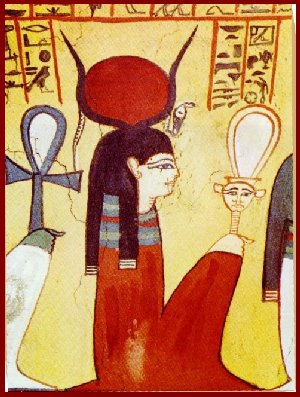
· Home
· Introduction
· Ancient Women
· The Middle Ages
· The Renaissance
· Bibliography
· Links to More Women of Interest

The Goddess, Athor and the Osirian Symbol
For the most part, the participation of women in the field of philosophy has been virtually ignored. In truth, however, the history of philosophy as exclusively the domain of men, is improbable.
Routinely text books teach the history of philosophy as beginning with Pythagoras, who lived approximately 600 BC, or with Socrates circa 500 BC. However, excavations in western Syria have produced thousands of tablets written in an ancient Semitic language, belonging to the period between 1400 and 1200 BC, which is more than seven hundred years before Socrates.
Tablets found in northern Iraq have provided scholars with information concerning legal customs of the 15th century BC, about one thousand years before Socrates. And in central Syria, thousands of tablets and fragments of tablets have been found written in two cuneiform languages, Sumerian and Syrian. These tablets belong to the early Bronze Age (perhaps 2500 BC) and pertain to commerce and culture in 3rd millennium Syria, roughly two thousand years before Socrates. Much of these archeological treasures contain information pertaining to politics, the exploits of the gods and goddesses, and poetry.
In addition, other early archeological findings of civilization date back to 6800 BC in Mesopotamia. From these discoveries we know the inhabitants of the region were matrilineal, goddess worshipping tribes. Archeological evidence reveals that the most ancient image of the divine was female. From Paleolithic times into the beginnings of ancient civilization, one finds the widely diffused image of the Goddess without an accompanying male cult figure. Images of the Goddess have been found throughout the ancient world and into India and western Europe.
By Neolithic times, these communities had advanced enough to have government through the temple, and a High-Priestess, who was their tribal leader and eventually called their Queen. During this same period, these women-led tribes developed farming, which urbanized their tribes, and as their tribes urbanized their religion evolved further. People believed that they must participate in the divine life to truly become human and ancient philosophy was rooted in spiritual groundwork.
The word Philosophy comes from the Greek philosophia, meaning "love of wisdom." These tribes’ capacity to form urbanized communities with the temple as the center of government, presided over by a Queen/High Priestess and an assembly of elders, together with the composition of written records and narratives concerning politics, law, and religion, is appreciable evidence that ancient humankind was capable of speculative musing- and of seeking wisdom. Consequently it is not plausible that there was no philosophical discussion or writing before Pythagoras or Socrates. Furthermore, due to women’s powerful religious status and political influence, it is unreasonable to conclude that women did not engage in coequal philosophical reflection.
Although it requires a greater research effort, it is possible to find records of female philosophers throughout history. However, the scope of this project allows for the inclusion of only a minor number of women philosophers. Therefore, I have not begun to include the many important--and sometimes heroic--women philosophers who came after the 1700s. Of the women I have cited, they had richer lives and more accomplishments than space and time allow me to cover. I encourage readers to search out our foremothers' rich contributions (in various disciplines) to the cultural evolution of humanity. This web source has been created as a small contribution toward the study of women's active participation in historical intellectual life.